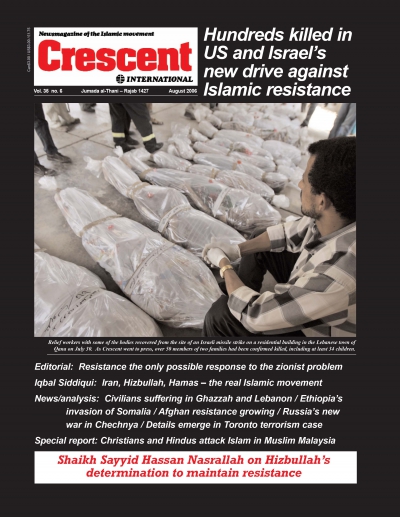Crescent International Vol. 35, No. 6
Newsmagazine of the Islamic movement
Iqbal Siddiqui
Rajab, 1427 2006-08


Since launching its murderous assault on Lebanon on July 12, Israel has destroyed 55 bridges, ripped up almost all the major roads in Lebanon, blasted scores of apartment buildings, and bombed Beirut's brand-new $600-million international airport, a power plant, milk factories, grain warehouses and hundreds of homes of the Lebanese: all ostensibly to "expel" Hizbullah, the Islamic resistance movement, from Southern Lebanon.

Crises bring out the best and worst in people. While Muslims everywhere have rallied in support of the Palestinian and Lebanese peoples facing the Israeli onslaught, the Arab regimes have joined the West's propaganda campaign against the Islamic resistance movement, Hizbullah.

One feature of current events in the Middle East is that the three Islamic movements that perhaps deserve the greatest respect and recognition from the global Ummah are standing together against the onslaught from the West.

The protests that have erupted around the Muslim world in support of the Muslims of Lebanon and in protest at the Israelis’ war on the country have been dominated by placards of Hizbullah’s leader, Sayyid Hassan Nasrallah.

Watching events unfolding in Lebanon over the last month, it has been impossible to avoid a sense that we have seen it all before, that what is now happening is merely a replay of what we have seen so many times already. Lebanon’s modern history has been dominated by Israeli attacks and interference, most notably in 1982, when the Israeli military devastated the country with air strikes and occupied Beirut itself.

In previous columns, we have examined the methodology of the Islamic Revolution and movement; now we must move to questions concerning the very survival of the Islamic Revolution and movement. As this column is written, the zionist military machine is launching wave after wave of air-raids and naval bombardments on the northern part of the Holy Land – Lebanon.

The Hizbullah, which is now under intense attack in Lebanon from Israel, emerged as an Islamic movement representing Lebanon’s ordinary Muslims after the Israeli invasion of the country in 1982. Eighteen years later, in 2000, Hizbullah’s resistance led to a stunning victory when the Israelis were forced to withdraw from territories they had occupied in the 1980s. Here we reprint an analysis of Hizbullah’s rise and modus operandi by Khalil Osman, first published in September 2000 to mark that triumph.

Speaking shortly after the Israeli attacks on Lebanon began, Shaikh Sayyid Hassan Nasrallah, the Secretary General of the Hizbullah spoke on the nature of the zionist problem and the importance of resistance, addressing the Lebanese people, the resistance fighters, and zionists and the wider Arab world separately. Here we publish a translation of his speech.

Malaysia is a Muslim country with substantial non-Muslim minorities. Although it cannot be considered an Islamic state, Islam plays a large part in its public life. ABDAR RAHMAN KOYA discusses Christian and Hindu attempts to “de-Islamise” it.

Qana has become synonymous with Israeli crimes. On July 30 the zionists repeated an outrage they perpetrated ten years ago by firing missiles into buildings where families were sheltering from just such bombing attacks. At least 54 civilians, 37 of them children, were murdered in the latest outrage; one of the dead was a baby girl only a day old. Several buildings were completely destroyed.

Israel's assaults on Ghazzah (starting on June 28) and on Lebanon (since July 12) have nothing to do with the capture of three Israeli soldiers, one by the Palestinians and two by Hizbullah. The demand for their release was merely a pretext to launch a war that had been planned in conjunction with the US several months ago.

Ethiopia – which has been amassing forces along the border with Somalia while secretly maintaining some inside – openly sent troops on July 20 to the town of Baidoa. This move was made not only to protect the Somali transitional government there against the advancing militias of the Islamic Courts Union (ICU), but also to take a leading role in the US's ‘war on terrorism' in the "failed state".

The current invasion of Somalia by Ethiopian troops – armed and funded by the US, which has military and intelligence units placed in neighbouring Djibouti – has already rekindled Somali fellow-feeling and pride in Islam. The result is that the people of Somalia are now united in strong support for the Islamic Courts Union (ICU) and opposition to the almost vanished transitional government in Baidoa.

While ignoring Palestine and Lebanon reeling under the barbaric onslaught of the zionists, the UN Security Council still found the time to talk about Afghanistan. Tom Koenigs, the UN envoy for Afghanistan, warned on July 27 that the Taliban were rediscovering their strength and that the fighting in Afghanistan now had to be called an insurgency, rather than just “isolated acts of terrorism”.

The fighting in Darfur has taken a new turn since the Sudan Liberation Army (SLA) split up into two factions that are now locked in battle with each other, ending their unity against the Sudanese army.

The case of the 17 Muslims arrested on terrorism-related charges in Toronto took a bizarre turn on July 13 when the police informant who had infiltrated the group went public with his role. Although it was already known to the Muslim community that he was a police plant, Mubin Shaikh went on CBC television to claim that he did it "to protect Canada".
